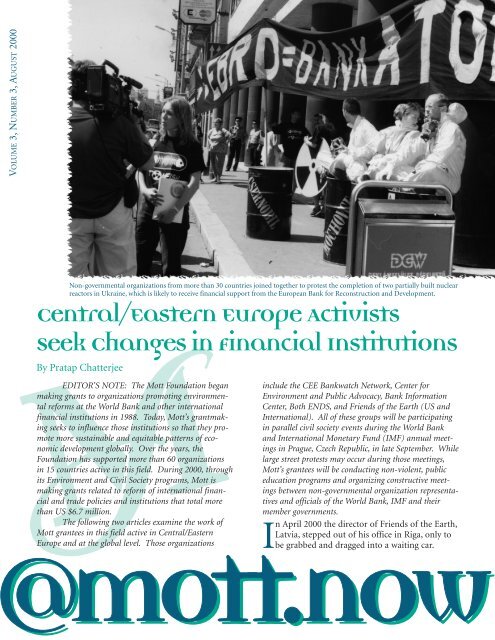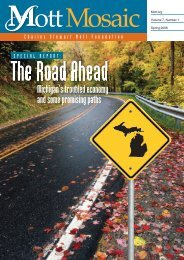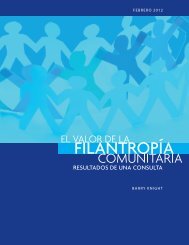mottnow August 2000 - Charles Stewart Mott Foundation
mottnow August 2000 - Charles Stewart Mott Foundation
mottnow August 2000 - Charles Stewart Mott Foundation
- No tags were found...
You also want an ePaper? Increase the reach of your titles
YUMPU automatically turns print PDFs into web optimized ePapers that Google loves.
local communities in different countries, whileStoczkiewicz works in Brussels. Likewise, CEEBankwatch’s national coordinators also live in theirlocal communities in the 11 member countries.This blossoming of activist groups acrossCentral/Eastern Europe, as well as Central Asia, isalso welcomed by Johan Frijns, who works on internationalfinancial institutions for Friends of theEarth International (FOEI) in Amsterdam, rightacross a canal from Both ENDS.Frijns was one of the principal organizers ofthe activist trainings in Madrid, and his organizationwill help bring activists from their 61 membercountries all over the world to Prague.“It is very exciting to see that these groups aretaking the lead in this work,” he said. “I feel that allour work over the years has really paid off.”Lisa Jordan echoed this sentiment: “When theBerlin Wall fell, there was lots of excitement aboutthe future of civil society, some of which was neverfulfilled. But the CEE Bankwatch Network is amodel for holding decisionmakers accountable, andI hope it will be a harbinger of the future for othernetworks in region.”Terlecki points out that developing democraticcitizen organizations in this region still facenumerous bureaucratic and financial obstacles.“In many countries, the governments have noexperience in dealing with nonprofit groups. InLithuania, for example, activists are taxed even onexpense reimbursements. In both Slovakia andUkraine, the banks in which we kept our moneywent bankrupt.”But support is now coming from some unexpectedquarters, such as Lars Larsson, a seniorEBRD official who is the acting team leader for theNuclear Safety Account.“I feel that all ourwork over the yearshas really paidoff.”- Johan Frijns,Friends of the EarthInternational“CEE Bankwatch Network should take pridein what it has accomplished,” he said. “I have a lot ofrespect for them. They have been a key contributorto our work in financing safety improvements inexisting nuclear plants and replacing less safe plantsby developing energy efficiency and alternative energysources. We need an open debate, and I wish thatthey were even stronger.”— — —Pratap Chatterjee is a freelance journalistbased in Berkeley, California. In 1994-1995 he reportedon the World Bank and the International MonetaryFund for Inter Press Service, a Third World NewsService, in Washington D.C.Organizing Grows in Rural SlovakiaBy Pratap ChatterjeeThe offices of the Center for Environment andPublic Advocacy (CEPA) are in Ponicka Huta,a village of 300 people on the northern end ofthe Polana mountains in central Slovakia, about halfan hour’s drive from the city of Banska Bystrica.CEPA is a founding member of the CEE BankwatchNetwork and part of Friends of the Earth Slovakia.CEPA moved to Ponicka Huta in 1994, twoyears after the center was set up in the national capitalof Bratislava. Despite its remote location, theoffice is a hive of organizing on a local, national andregional level around three themes: public interestlaw, water and the global economy.Its activities include organizing seminars to“We needed to …help thecommon peopleunderstand whyit is importantto followeconomicglobalization.”- Juraj Zamkovsky,CEPA6
teach mixed race Afro-Slovak andRomany (gypsy) people abouttheir legal rights against raciallymotivated attacks. CEPA also hasheld regional trainings for activistsfrom eight Central/EasternEuropean countries in the damaffectedtown of Dubakovo onhow to challenge the internationalfinancial institutions.CEPA’s Global EconomyProgram, which was set up in1993, involves research, supportfor public participation in economicdecisionmaking, networkingand education on internationalfinancial institutions.“We understood the relevanceof globalization for thecountry. However, at that time itwas completely new, ‘impersonal’and too complex, and there wasliterally nobody dealing with it inSlovakia in a serious way,” saidJuraj Zamkovsky, CEPA chairman.“We needed to raise this issue within society and tomonitor several projects, which would help thecommon people understand why it is important tofollow economic globalization.”For example, seven years ago, CEPA joinedthe campaign of the Forest Protection MovementWolf, an environmental group in eastern Slovakia,to defeat a proposed World Bank loan for logging.Ongoing logging activities during the pastfew decades has caused Slovakia to lose much of its300-year-old primary forest, which was rich inorganic materials and supported a wide variety ofplant and animal life.The US$90-million proposed World Bankloan would have more than doubled logging activity,from 4.4 million cubic meters in 1991 to 11 millioncubic meters by 2030. The activists say the plansignored the poor state of existing Slovak forests.“The World Bank so-called ‘ecologization ofSlovakian forestry’ would have involved the buildingof major new roads, buying large quantities of heavyequipment, reduction and elimination of exportquotas, planting fast-growing forests, and paying offthe loan through exports,” Zamkovsky said.In order to prevent similar unsustainableproject loans, CEPA decided to tackle the WorldBank’s Country Assistance Strategy (CAS) for all ofSlovakia has lost much of its primary forests due to excessive logging and poor forestmanagement practices.Slovakia. This forced the Bank’s regional office inBudapest, Hungary, to meet with them twice thisyear.At a February meeting, the Bank offered thelocal groups a draft version of the strategy. CEPAwas ready with its own strategies, based on a seriesof recommendations it had compiled from localSlovak groups to address what it believed the Bankshould do in order to foster a sustainable economyfor Slovakia.To CEPA’s surprise when staff membersarrived for the second meeting, which was heldMarch 18 in Bratislava, the Bank appeared not tohave taken any of their suggestions into considerationbecause it offered no new strategy. In addition,one Bank official admitted they had little knowledgeof the real situation in Slovakia.One participant in that meeting said hebecame skeptical of the Bank’s intentions when heoverhead a Bank official saying after the meeting toa colleague, “These are the type of radicals who wereprotesting in Seattle last November.”“This raises the question as to why the Bankspent money for such expensive meetings to ‘consult’with us, when clearly none of the commentsand concerns of non-governmental organizations isbeing considered in the formulation of the CASdocument,” Zamkovsky said. “It certainly implies,7
Partnerships between non-government organizations and communities such as Dubakova inrural Slovakia are important to the long-term success of environmental reforms inCentral/Eastern Europe.now that the consultations for the CAS are officiallyclosed, that it was all merely a public relations ploy,or at most the skeleton fulfillment of standard procedures,rather than a genuine public participationprocess.”Zamkovsky issued a press release condemningthe Bank’s failure to listen to local communities.The result was that the Bank postponed finalizingthe CAS. Zamkovsky is hoping that, if and when theBank issues its final strategy, it finally will take intoaccount the activists’ suggestions.Meanwhile, CEPA is investigating the threeother international financial institutions operatingin the region: the International Monetary Fund(IMF), the European Bank for Reconstruction andDevelopment (EBRD), and the EuropeanInvestment Bank (EIB).For example, in 1999 CEPA published “AThorny Path of Aluminum Producers to Europe,”which investigated the environmentalimpact and the“corruption, lobbying, pseudo-democracy”involved inthe first large loan made byEBRD in Central Europe in1993 to the ZSNP aluminumplant in Ziar nad Hronom.With support fromCarol Welch at Friends of theEarth US, CEPA has begunthe challenge of making theIMF accountable. As a firststep, staff members had ameeting with the Slovakprime minister. They won apromise to get full documentationof the IMF’s work inthe country.Zamkovsky says that,sometimes, one of CEPA’sbiggest ongoing challenges isconvincing the local populationthat it is possible to winthese battles.“The local populationis skeptical of us because weoppose the government,” hesaid.But he firmly believes this will change whencommunities see the benefits of this work, such aswhen CEPA provided legal support for the village ofDubakova to overturn a ban on local developmentimposed by the government in order to allow theconstruction of a major dam.In June, CEPA worked with Friends of theEarth International to bring activists from all overCentral/Eastern Europe to the site of this local victoryto share skills on confronting the World Bank.Today CEPA is helping prepare a number ofdocuments for the participants at the Prague <strong>2000</strong>meeting, such as a handbook on CAS strategies, anewly written analysis of the IMF’s role in Slovakia,and a case study on the International FinanceCorporation (the private-sector arm of the WorldBank) and its pulp mill project in Ruzomberok.8
Civil Society Program Director HiredRay Murphy of Dublin, Ireland, whohas extensive professional experiencein the nonprofit field internationally,has joined the <strong>Mott</strong> <strong>Foundation</strong> as CivilSociety Program Director. The program isone of the <strong>Foundation</strong>’s four main areas offocus.Murphy will be responsible for managingthe Civil Society program in theUnitedStates andabroad.Althoughhe will bebased inDublin,Murphywill spendtime in<strong>Mott</strong>’shomeoffice inFlint andalso beRay Murphyresponsiblefor oversightof the <strong>Foundation</strong>’s Civil Societyregional offices in Johannesburg, SouthAfrica, and in Prague, Czech Republic.Murphy is replacing Jon Blyth, whoretired after serving 24 years with the<strong>Foundation</strong>, most recently as Civil SocietyProgram Director, stationed in the<strong>Foundation</strong>’s Prague regional office. (Seerelated article on page 10.)In a related development, ProgramOfficer Shannon Lawder has been promotedto Regional Director for Central/EasternEurope. She will manage the day-to-dayoperations of the Prague regional office andoversee the foundation’s grantmaking activitiesthroughout Central/Eastern Europe andRussia. Lawder has been a <strong>Foundation</strong>employee in the Prague office since 1995,with her work focused on grantmaking inRussia and Ukraine.Before joining <strong>Mott</strong>, Murphy workedfor seven years for Tara Consultants, aninternational philanthropy that makesgrants to support programs in the fields ofeducation, rights and justice, and increasedvolunteerism and philanthropy. As a seniorconsultant at Tara, Murphy was responsiblefor three program areas, including grantmakingin Central/Eastern Europe. He alsoserved as the organization’s humanresources manager.Prior to joining Tara Consultants in1993, Murphy was deputy CEO of theNational Council for the Blind of Ireland, anonprofit organization, for almost threeyears. His responsibilities included managementof 26 county branches throughoutIreland. In addition, Murphy has worked asa human services rehabilitation consultantfor three organizations in Ireland and theUnited States. Early in his career, Murphyserved as a social worker for students withlearning disabilities in a residential vocationalhigh school in Ireland, as a communitydevelopment worker in Ireland, and as ayouth worker in Germany.Murphy received a bachelor’s degreein German and philosophy from UniversityCollege Cork, Ireland, and a master’s inbusiness administration from TrinityCollege in Dublin. He also holds a diplomain social administration from UniversityCollege Dublin and a certificate of qualificationin social work from the University ofEdinburgh in Scotland.9
Program Director Jon Blyth RetiresBy Maggie JaruzelJon Blyth says two senses, ortraits, are crucial to survival inthe foundation world — asense of humor and a sense ofhumility. Colleagues, grantees andfriends agree that Blyth exhibitedboth during his 24-year career atthe <strong>Mott</strong> <strong>Foundation</strong>.The man with a keen mindand compassionate heart alsomade his mark as a prolific programofficer, leaving behind animpressive record of grantmaking.Jimmy L. Krause, Director ofGrants Administration, said Blythprocessed and monitored morethan 1,100 grants that totaledabout $90 million during histenure at the <strong>Foundation</strong>.“Throughout the course ofa distinguished career, Jon usedhis leadership and organizationalskills in every program of the <strong>Foundation</strong>, beginningwith community education,” <strong>Mott</strong> PresidentWilliam S. White said. “Although we will miss him,I plan to call upon him for advice and counsel in hisretirement years.”Uncomfortable in the spotlight, Blyth quicklyshifts the focus to the people and programs he hasbeen involved with during the past two dozen years.And they are vast and varied. He is the only programstaff member who has worked in each of the<strong>Foundation</strong>’s four programs: Civil Society, FlintArea, Environment and Pathways out of Poverty.Most recently, Blyth worked as Civil SocietyProgram Director, stationed in the <strong>Foundation</strong>’sPrague, Czech Republic, regional office, which hehelped establish.Blyth is humbled, yet proud, that he has beena part of improving people’s lives in the UnitedStates and abroad. For example, grantmaking in thePrague office allowed for monitoring of democraticelections in former totalitarian states such asSlovakia, dramatically changing people’s way of life.“It’s not hard to get passionate about thisbeing a real window of opportunity, and the windowof opportunity is not just a few years,” BlythJon and Jane Blythsaid. “It might be 20, 30, 40 years for a new Europeto embrace creative democracies and marketeconomies.”Blyth’s genuine love for people and his passionto improve their plight endeared him to manygrantees, including one in the Environment programin the early 1980s. The Rev. Bruce Youngvividly recalled the day he saw tears flow downBlyth’s cheeks while listening to mothers in Woburn,Massachusetts, tell how their children — one by one— died from cancer.“You don’t let yourself be driven by emotions,”Blyth said. “But I think it’s well and good tobe emotional and passionate about things; it canmotivate you intellectually.”He was also motivated by interacting withpeople — from the grassroots level to policymakers.“I’d want to know what the kids and the crewchiefs thought about the programs,” Blyth said. “Atthe other end, I would put a suit on and go talk tothe assistant secretary of labor and other policy people.I would try and make sure I covered all thebases. I’d do it because it was important andbecause it was great fun to wear a suit one day andblue jeans the next.”10
Blyth’s <strong>Foundation</strong> career began somewhatserendipitously in 1976 after he found himself losinga job when the manufacturing company heworked for in Detroit was about to be merged witha larger corporation.He was intrigued by the opportunity to blendhis social conscience with his professional career. Soafter having spent about 15 years in the field ofengineering, research and management, Blyth joinedthe <strong>Foundation</strong>.He credits his practical experience in thebusiness world and his formal education – a bachelor’sdegree in mechanical engineering from DukeUniversity and a master’s degree in business administrationfrom the University of Chicago — withenabling him to serve the <strong>Foundation</strong> as a strategicplanner and program designer.“My job has been to grow the program areas,help to hire staff and do quite of bit of strategicplanning,” he said. “Sometimes we got lucky andthings would go well. Sometimes we’d run intoproblems. But we always had a lot of fun.”During his tenure, Blyth has witnessed phenomenalgrowth at the <strong>Foundation</strong>. When he startedin 1976, <strong>Mott</strong> had a staff of about 20 (includingsix in programs), assets of $462.5 million and madegrants that totaled $12.9 million. Today, <strong>Mott</strong> has astaff of close to 100 (including 36 in programs). Atthe end of 1999, its assets were $3.23 billion, andgrants totaled $113.9 million in 1999.Blyth has only one regret from his<strong>Foundation</strong> career.“I lived in Prague for five years, but neverreally learned to speak the Czech language well.”So what’s next for the man who was equallyenriched by having met worldwide heads of stateand homeless men and women living in the streets?He is returning to his roots to live out hisboyhood dream — almost. Instead of assuming acareer as a professional golfer at age 62, Blyth andhis wife, Jane, look forward to welcoming theirblended family of seven grown children and fourgrandchildren at their new retirement home. It’slocated on the first fairway of a golf course outsideWhitehall, Michigan. The house is within walkingdistance of Lake Michigan and not far fromMuskegon, where he was born.Program Officer Leaving foundation to join COFSuzanne Feurt, who has worked at the <strong>Mott</strong><strong>Foundation</strong> since 1979 in programs, has beennamed managing director of community foundationsfor the Council on <strong>Foundation</strong>s (COF) inWashington, D.C.In her new post, Feurt will work with COF’s410 community foundations to achieve their visionof acting collectively as a field, and to fulfill theiragenda in six priority areas: professional development,legislative advocacy, technology, marketing,standards of practice and community impactthrough grantmaking.“We are going to miss Suzanne’s expertise,experience and enthusiasm at the <strong>Mott</strong> <strong>Foundation</strong>,but we are pleased that her many years of work incommunity foundations will continue to benefit thefield as a whole,” said William S. White, Presidentand CEO of the <strong>Mott</strong> <strong>Foundation</strong>.“We are delighted to have someone ofSuzanne’s caliber aboard,” said Dorothy S. Ridings,COF’s president and CEO. “She brings a great dealof passion for the cause, a deep knowledge of philanthropyand an understanding of the issues facingSuzanne Feurtthe foundationfield today.”JackHopkins, presidentand CEO of theKalamazoo<strong>Foundation</strong> inMichigan andchairman of COF’sCommunity<strong>Foundation</strong>sLeadership Team,called the choice ofFeurt a “terrific”move.“She’s known by our colleagues throughoutthe community foundation sector as having enormousenergy and a vision for the future,” he said.“I’m particularly looking forward to working withher in her new capacity.”As a program officer at <strong>Mott</strong>, Feurt wasresponsible for the <strong>Foundation</strong>’s grantmaking in11
strengthening and expanding philanthropy, volunteerismand the nonprofit sector in the United Statesand globally. This work involved several initiatives tobuild the capacity of community foundations domesticallyand overseas.From 1984 to 1995, she created and implemented<strong>Mott</strong>’s Community <strong>Foundation</strong>s and NeighborhoodsSmall Grants Program. The program wasdesigned to encourage community foundations to supportemerging and established resident groups in lowincomeneighborhoods. During that time, the<strong>Foundation</strong> provided more than $6.4 million in challengegrants and technical assistance to 21 communityfoundations across the country.While at <strong>Mott</strong>, Feurt also developed and manageda series of strategic grant initiatives in historicallyblack colleges and universities, and in several otherareas. And she served as a loaned executive to theWhite House, assisting in setting up President RonaldReagan’s Task Force on Private Sector Initiatives.Production CreditsPhotography: pages 1-5 – CEE Bankwatch Networkpage 6 (top) – Friends of the Earth Internationalpages 6-8 – Andrej Zeman, Slovakiapages 9-11 – Rick Smith, Rochester, MichiganProject Managment: Valerie A. Osowski,<strong>Charles</strong> <strong>Stewart</strong> <strong>Mott</strong> <strong>Foundation</strong>Production Managment: Donald F. Dahlstrom,<strong>Charles</strong> <strong>Stewart</strong> <strong>Mott</strong> <strong>Foundation</strong>Design: olmstedassociates, Flint, MichiganPrinting: The McKay Press, Inc., Midland, MichiganMost recently, Feurt served for three years as aloaned executive from <strong>Mott</strong> to the European<strong>Foundation</strong> Centre in Brussels, Belgium, a membershipassociation comprised of independent fundersfrom 35 countries, where she coordinated itsCommunity Philanthropy Initiative.Before joining the <strong>Foundation</strong>, she was aresearch and exhibit coordinator at the Alfred P. SloanMuseum in Flint, and a historical interpreter with theNational Park Service in Hyde Park, New York.Over the years, Feurt has been active in professionaland community leadership activities at the local,state, national and international levels. She holds abachelor’s degree in history from Kalamazoo (Mich.)College.The Council on <strong>Foundation</strong>s is a nonprofitmembership organization of more than 1,900 grantmakingfoundations and corporations that works topromote and enhance responsible and effectivephilanthropy.contact@us1200 <strong>Mott</strong> <strong>Foundation</strong> Building,Flint, MI 48502-1851Phone: (810) 238-5651Fax: (810) 766-1753Publication Request Line:(800) 645-1766 (U.S., Canada)(414) 273-9643 (elsewhere)Web site: http://www.mott.orgE-mail: infocenter@mott.orgCHARLES STEWARTMOTT FOUNDATION<strong>Charles</strong> <strong>Stewart</strong> <strong>Mott</strong> <strong>Foundation</strong>1200 <strong>Mott</strong> <strong>Foundation</strong> BuildingFlint, MI 48502-1851Nonprofit Org.U.S. PostagePaidFlint, Mich.Permit No. 19612














